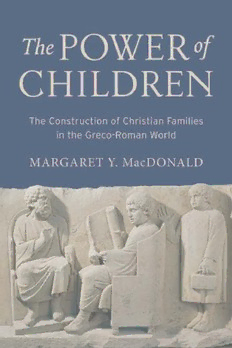
The Power of Children: The Construction of Christian Families in the Greco-Roman World PDF
Preview The Power of Children: The Construction of Christian Families in the Greco-Roman World
The Power of Children This page intentionally left blank The Power of Children The Construction of Christian Families in the Greco-Roman World Margaret Y. MacDonald Baylor University Press © 2014 Baylor University Press Waco, Texas 76798-7363 All Rights Reserved. No part of this publication may be reproduced, stored in a retrieval system, or transmitted, in any form or by any means, electronic, mechanical, photocopying, recording, or otherwise, without the prior per- mission in writing of Baylor University Press. Scripture quotations, where not an author’s own translation, are from the New Revised Standard Version Bible, copyright 1989, Division of Christian Education of the National Council of the Churches of Christ in the United States of America. Used by permission. All rights reserved. Cover Design: Andrew Brozyna, AJB Design, Inc. Cover Art: Stone burial monument with relief representing Neumagen school with teacher and pupils, about 180 / De Agostini Picture Library / G. Dagli Orti / The Bridgeman Art Library eISBN: 978-1-4813-0225-8 (ePDF) This E-book was converted from the original source file by a third-party vendor. Readers who encounter any issues with formatting, text, linking, or readability are encouraged to notify the publisher at BUP_Production@ baylor.edu. Some font characters may not display on all e-readers. To inquire about permission to use selections from this text, please contact Baylor University Press, One Bear Place, #97363, Waco, Texas 76798. Library of Congress Cataloging-in-Publication Data MacDonald, Margaret Y. The power of children : the construction of Christian families in the Greco-Roman world / Margaret Y. MacDonald. 251 pages cm Includes bibliographical references and index. ISBN 978-1-4813-0223-4 (hardback : alk. paper) 1. Children —History. 2. Children—Biblical teaching. 3. Families—His- tory. 4. Christianity and other religions—Greek. 5. Christianity and other religions—Roman. 6. Church history—Primitive and early church, ca. 30-600. I. Title. BR195.C46M33 2014 261.8’358509015--dc23 2014010732 Contents Acknowledgments vii 1 Introduction 1 The Codes and Children 2 Small, Silent, but Ever Present 33 Slave Children in Colossians 3:18± 4:1 3 Socialization and Education 67 The Nurture, Teaching, and Discipline of Children in Ephesians 5:21± 6:4 4 The House Church as Home School 109 The Christian Assembly and Family in the Pastorals 5 Conclusion 149 How Remembering the Little Ones Changes Things Notes 165 Works Cited 207 Index of Ancient Sources 221 Index of Modern Authors 230 Subject Index 234 v This page intentionally left blank Acknowledgments ith this book, I bring together two of my main interests Win the study of Christian origins: early Christian fami- lies and the disputed Pauline literature. Over the past ten years I have been enriched by the work of scholars too numerous to mention. Two groups gathering in conjunction with the meeting of the Society of Biblical Literature, however, have been especially influential: the Disputed Paulines Section and the Early Christian Families Group. I would like to extend special thanks to the Social Sciences and Humanities Research Council of Canada for supporting my research on children and childhood in early Christian house churches. In par- ticular, funding from this granting agency facilitated fruitful conver- sations with Carolyn Osiek (Emerita, Brite Divinity School), Adele Reinhartz (University of Ottawa), and Cecilia Wassen (Uppsala University). I have benefited enormously from their collective knowl- edge of Roman, early Christian, and Jewish sources in interpreting the evidence for the lives of children examined in this book. I would also like to thank my own university, St. Mary’s University (Halifax, Nova Scotia), for research support and my former university, St. Fran- cis Xavier University (Nova Scotia), for offering me encouragement in the form of the senior research award in May 2012. The staff at Baylor University Press has provided excellent guid- ance and support. I extend special appreciation to Carey Newman vii acknowledgments viii for his consistent engagement with the project and many helpful suggestions. This book is dedicated to my lifelong partner Duncan Macpher- son, with whom I have spent many hours discussing children. He is a wonderful husband and father to our children, Delia and Jake. For more than thirty years, his support of my scholarship has been unfaltering. 1 Introduction The Codes and Children n the middle of the first-century CE, in ancient Colossae or ILaodicea, a group of believers in Christ is gathered in the house of a woman named Nympha (Col 4:15). Her house is a modest peristyled house or domus (a building with a colonnade), but the inte- rior courtyard is large enough for an assembly of about fifty people to gather. It is the same space where earlier in the day children had been practicing their singing of psalms, hymns, and spiritual songs. New- comers have listened eagerly to the rejoicing and are eager to be taught this spiritual wisdom (Col 3:16). But now people are making an effort to listen quietly, with a slave caregiver doing her best to settle the tod- dlers in her charge. A letter from the Apostle Paul is being read aloud in the midst of the assembly (Col 4:16). Slave and free children are sit- ting side by side and are addressed directly, being told that they must obey their parents in everything, for this is their acceptable duty in the Lord (Col 3:20). Older slave children, already aware of the confines of their servitude and constantly reminded of the authority of their masters (Col 3:20-23), are nevertheless surprised to hear a comfort- ing message: like freeborn sons and daughters, they will receive their inheritance from the Lord (Col 3:24). Not too far away in ancient Ephesus, a father is teaching scrip- tural traditions (Eph 6:2-3) to his children, along with the stories he knows about Jesus (Eph 6:4). But these children are not only those born to his wife; they also include the slave children who live in the house and children who are playmates from the neighborhood. Some 1
